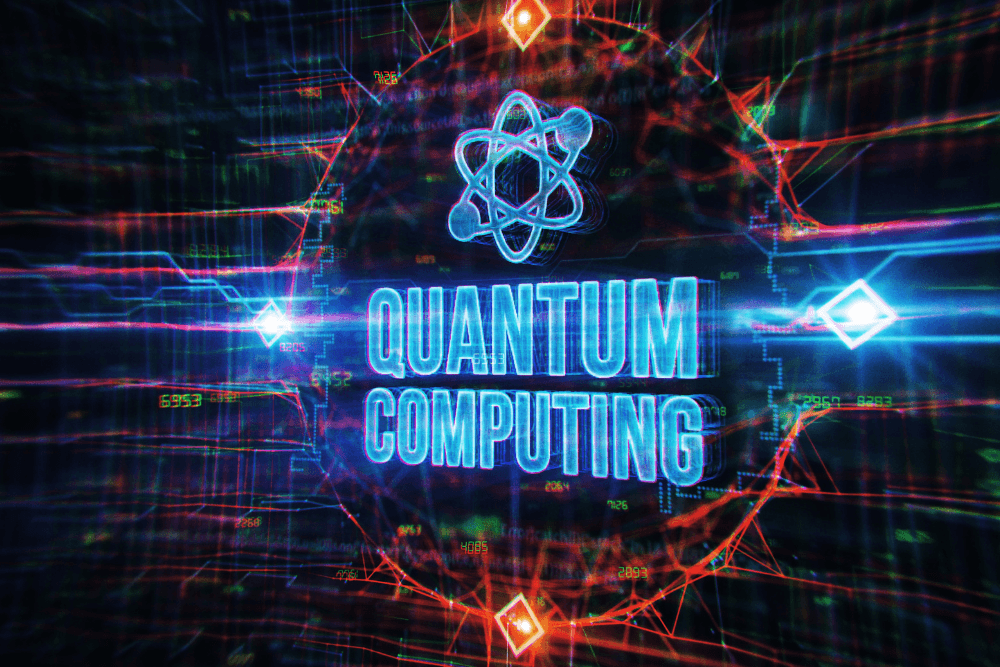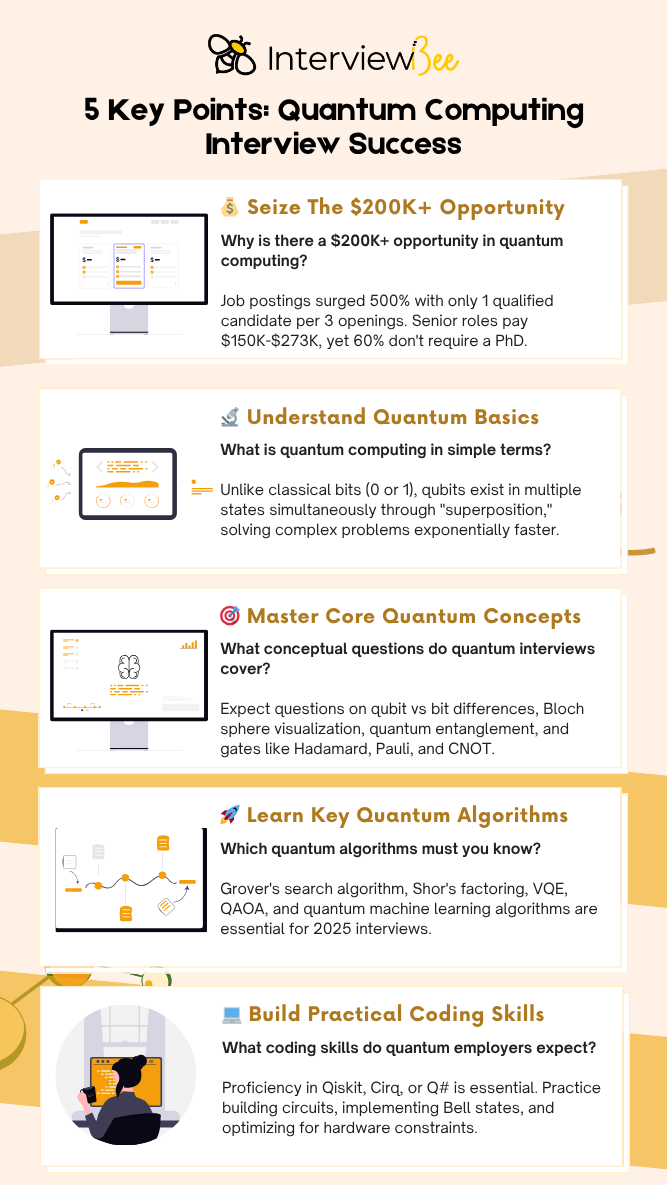
Quantum Computing Interview Questions 2025 Guide
- Author: Anindita Ghosh
- Published On: Oct 22, 2025
- Category:Interview Guide
Quantum computing interviews are becoming the gateway to $200K+ salaries, yet most tech professionals are completely unprepared. While job postings have surged 500% in the last five years, the industry faces an unprecedented shortage: only one qualified candidate exists for every three quantum computing job openings. For ambitious professionals, this represents an extraordinary window of opportunity to enter a field where demand vastly outstrips supply.
The $200K+ Opportunity Nobody Sees
By the year 2030, the quantum computing market is expected to be in the tune of 20.20 billion with a whopping 41.8 per cent compound annual growth rate. However, the truth behind it is as follows: fewer than half of quantum computing jobs will be occupied by 2025 unless radical measures are taken.
This scarcity is reflected in the remuneration. Positions in quantum computing entry-level are between 80,000 and 120,000 a year, but more experienced employees have salaries that are much higher. Quantum Algorithm Scientists with experience earn salaries of between 150,000 and 273,000, and Quantum Research Scientists earn salaries of between 135,000 and 226,000. Principal Software Engineers at such companies as Google Quantum AI make between 253,000 and 363,000. Their origin can be found in the Quantum Computing Jobs Report 2024.
Source:Quantum Computing Jobs Report 2024
What's surprising? More than sixty percent of quantum jobs do not need a PhD. The analysis of the Chicago Quantum Exchange shows that 55 percent of quantum jobs only need a bachelors degree or lower, which is more available than one might assume.
What is Quantum Computing, Anyway?
Moving on to the interview questions, here is the background: Quantum computing is based on the principles of quantum mechanics to process information in a significantly different way compared to the traditional computers. Classical computers work with bits (0s and 1s), whereas quantum computers deal with qubits which can be in a superposed state (to be in many states at the same time). This enables quantum computers to solve some complex problems, such as molecular simulation, cryptography and optimization exponentially faster than classical computers. Consider it a transformation of one-lane road to a multi-dimensional highway to particular types of calculations.
What Employers Actually Ask in Quantum Computing Interviews
Understanding quantum computing interview questions is crucial for breaking into this lucrative field. The interviews combine theoretical knowledge, practical programming skills, and fundamentally different computational thinking.
Core Conceptual Questions
Interviewers consistently probe candidates' understanding of fundamental quantum concepts. Expect quantum computing interview questions about qubits and their properties, including superposition (how a qubit exists in multiple states simultaneously) and entanglement (how qubits correlate in ways that have no classical analog).
Common entry-level questions include:
- "Explain the difference between a classical bit and a qubit" - Tests understanding of superposition and how qubits can represent both 0 and 1 simultaneously
- "What is the Bloch sphere and how does it represent qubit states?" - Assesses knowledge of quantum state visualization
- "Explain quantum entanglement and the no-cloning theorem" - Evaluates grasp of fundamental quantum properties
- "Describe quantum gates like Hadamard, Pauli (X, Y, Z), and CNOT" - Tests understanding of quantum circuit building blocks essential for algorithm design
Quantum Algorithm Questions
The heart of quantum computing interviews revolves around quantum algorithms. Key algorithms you'll be expected to discuss:
- Grover's Search Algorithm - Provides quadratic speedup for unstructured search problems, reducing search time from O(N) to O(√N)
- Shor's Factoring Algorithm - Can factor large integers in polynomial time, threatening current cryptographic systems
- Variational Quantum Eigensolver (VQE) - Hybrid quantum-classical algorithm used for molecular simulation and optimization on NISQ devices
- Quantum Approximate Optimization Algorithm (QAOA) - Tackles combinatorial optimization problems on near-term quantum computers
- Quantum Machine Learning Algorithms - Particularly hot in 2025 for applications in drug discovery, financial modeling, and optimization problems
Coding Challenges
Modern quantum computing interview questions heavily emphasize practical programming skills. The most common frameworks are Qiskit (IBM), Cirq (Google), Q# (Microsoft), and PennyLane (Xanadu), with Qiskit becoming the industry standard.
Typical coding challenges you'll encounter:
- Construct basic quantum circuits - Create Bell states (maximally entangled two-qubit states) or implement quantum teleportation protocols
- "Using Qiskit, build a circuit with a Hadamard gate on one qubit, followed by a CNOT to a second qubit, then measure both" - Tests framework proficiency and gate understanding
- Implement quantum algorithms from scratch - Code Grover's or Deutsch-Jozsa algorithm using a specific quantum framework
- Optimize circuits for hardware constraints - Minimize circuit depth and gate count for specific quantum devices
- Demonstrate noise mitigation techniques - Apply error correction strategies for real quantum hardware with decoherence issues
How to Prepare for Quantum Computing Interviews
Breaking into quantum computing requires strategic preparation, but multiple accessible pathways exist.
Start with fundamentals: Strengthen your linear algebra and Python programming skills. Understanding vector spaces, matrix operations, and eigenvalues is non-negotiable. Most quantum frameworks are Python-based, making programming proficiency essential.
Use free resources: The IBM Qiskit Textbook offers comprehensive coverage from quantum states through advanced algorithms with executable code examples. Microsoft's Quantum Katas provides hands-on exercises building quantum programming intuition. IBM provides free cloud access to real quantum computers, an unprecedented educational opportunity.
Build a project portfolio: Implement quantum machine learning algorithms, explore quantum chemistry simulations, or develop quantum optimization solutions. Document projects thoroughly on GitHub. One well-executed project demonstrates more than dozens of tutorial completions.
Practice with AI mock interviews: Just like preparing for traditional tech interviews, practicing quantum computing interview questions with AI-powered mock interviews helps refine your explanations and build confidence. InterviewBee's Mock AI Interviewer can simulate technical interviews tailored to quantum computing roles, providing real-time feedback on your responses.
The Window Won't Stay Open Forever
The quantum computing skills gap creates unprecedented opportunity, but that window won't remain open indefinitely. Job postings have surged 500%, salaries exceed $200,000, yet only one qualified candidate exists for every three openings.
Major companies, including IBM, Google, Microsoft, Amazon, and specialized startups like Quantinuum, IonQ, and Rigetti, are hiring aggressively. They're willing to pay premium salaries because the potential value quantum computing unlocks justifies significant investment in human capital.
The quantum revolution is happening now; the only question is whether you'll be ready to join it. Those who begin building quantum computing expertise today will be positioned as experienced professionals when fault-tolerant quantum computers become widespread in the coming years.



